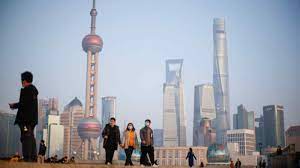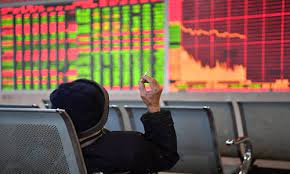Shanghai index regains 3,000 points with support policies, improvement of economic fundamentals

Beijing: China’s three major A-share indexes continued to close higher across the board on Friday trading, with the benchmark Shanghai Composite Index regaining 3,000 points and recovering all losses since the beginning of 2024. Experts said they were mainly boosted by effective support policies to stabilize the stock market and continuous improvement of economic fundamentals.
Based on the strong drive of the domestic consumption market, stable foreign trade as well as increasing foreign investment, analysts noted that the stock market will remain stable and the country is expected to see economic growth of above 5 percent in the first quarter of 2024, laying a solid foundation for the economic rebound throughout the year.
The Shanghai Composite Index rose for the eighth straight day on Friday, up 0.55 percent to close at 3,004.88 points. The Shenzhen Component Index increased by 0.28 percent and the ChiNext Index, which tracks China’s Nasdaq-style board of growth enterprises, rose 0.02 percent.

Over 4,300 individual stocks closed higher, and 141 stocks rose to their daily limit. Trading at Shanghai and Shenzhen stock markets reached 922 billion yuan ($128.1 billion). Sora concept stocks led the two markets throughout the day, with robotics concept stocks and auto industry chain higher in afternoon trading.
“This week, the A-share market saw a sustained uptrend with a continuation of the pre-holiday upward trend. The regaining of the 3,000 points is a reflection of rising market confidence, and the eight-day gains have effectively enhanced market expectations, indicating that the stock market is expected to remain stable,” Yang Delong, chief economist at Shenzhen-based First Seafront Fund Management Co, told the Global Times on Friday.
Yang noted that the stock performance is mainly because the state-owned Central Huijin Investment – seen as a key player in the “national team” – pledged to ramp up investment in the A-share market.
In addition, the China Securities Regulatory Commission (CSRC), the country’s top securities regulator, has rolled out an array of reform policies, sending positive signals to the capital market, Yang added.
The commission, led by its newly appointed chairman Wu Qing, held more than 10 back-to-back meetings this week with a wide range of market participants to solicit suggestions on regulations, risk prevention and high-quality development.
In the first press briefing in the Year of the Dragon on Friday, the CSRC vowed that it will adhere to an investor-centered approach, scrutinize enterprises that are to be listed, and severely punish those who violate the law and infringe upon the interests of investors, so as to improve the quality of listed companies from the source.
“Both companies under review for listing and those already listed are subject to continued strict supervision by the CSRC,” it noted.
The commission also vowed to build a “penetrating” screening system using multiple technological measures, including all-round monitoring, big data, multi-channel collection and intelligent analysis to identify and crack down on illicit market manipulation and insider trading. Penalties for market illicit practice will increase, and the cost of law breaking will also be higher, it said.
Tian Xuan, associate dean and chair professor of finance with the PBC School of Finance at Tsinghua University, who attended a CSRC meeting on Sunday morning chaired by Wu, told the Global Times that these meetings demonstrated the sincere attitude of the CSRC to fully listen to and respect the views of all parties in the market and respond to their concerns, releasing a warm policy signal of jointly building the market and making continuous efforts to stabilize the market and confidence.
“The positive stock performance is also thanks to the continuous improvement of the economic indicators, especially the Spring Festival holiday spending,” Tian Yun, a veteran economist based in Beijing, told the Global Times on Friday.
According to the Ministry of Culture and Tourism, the number of trips made during the holidays represented a 19 percent rise from the same period in 2019 before the pandemic, and total spending increased by 7.7 percent from that of the same period in 2019.
Looking ahead, Tian Yun expected economic growth of above 5 percent in the first quarter of this year, as the country’s foreign trade and foreign investment are expected to see stable development.
Although China’s foreign trade figures for the first two months have yet to be disclosed, the number of the country’s container shipments to the US increased by 20 percent year-on-year in January, domestic media outlet ifeng.com reported on Thursday, citing data from US research firm Descartes Datamyne.
Noting that the figures may point to the recovery of China-US trade exchanges, Tian Yun said that if the imports and exports of China and the US can maintain positive growth this year, foreign trade will make a vital contribution to the country’s economic recovery.
Multinational corporations also remain optimistic about the opportunities for the development of the Chinese market, and continue to step up their efforts to invest in China.
On Friday, Premier Li Qiang convened an executive meeting of the State Council to study policy initiatives to attract and utilize foreign investment more vigorously. On the same day, the Ministry of Commerce said that in January, foreign investors set up 4,588 new foreign-funded enterprises, a year-on-year increase of 74.4 percent against the backdrop of last year’s sustained growth.
Those positive signals came before the country is slated to set a slew of development targets, including the GDP growth rate for 2024, during the upcoming annual two sessions, which are scheduled to kick off in early March.
In 2023, among the 31 Chinese provinces, regions and cities, the number of Chinese cities with GDP exceeding one trillion yuan increased from 24 to 26. The economies of each province and city, like rivers, flow together and form the vast ocean of the Chinese economy. They provide an inexhaustible source of dynamism and potential for China’s development, China’s Foreign Ministry told a press conference on Friday.





